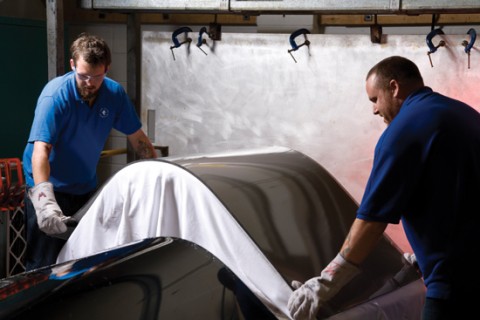Ahead Of The Curve
October 11, 2010
Trend Marine expand into superyacht, supersize glazing solutions
As yachts get bigger and yacht designers and their clients demand more flexibility in the exterior design and styling resulting in larger windows, windscreens, doors and port lights, Trend Marine glazing solutions has ensured they are ahead of the curve, adding to the extensive range of marine glazing products and precision manufacturing expertise.
Trend Marine based in Norfolk, UK, has a continuous investment programme now adding a new ‘sag bending’ furnace and chemical toughening plant to the extensive manufacturing base. This enables Trend Marine to add to the turn-key glazing packages, already supplied to the top yacht builders and shipyards worldwide, by producing and fitting complex curved and laminated glazing to the largest of superyachts.

Trend Marine, part of the US giant Taylor Made Group, has been steadily growing their business for over 37 years, keeping ahead with glazing solutions for yacht builders worldwide. The impressive 12 acre site in Catfield, Norfolk, currently produces complete boat-sets from curved windscreens to complex doors and powered sunroofs, for a wide range of yachts right up to the largest superyachts.
New-build customers for the larger superyachts are moving away from the more traditional yacht designs and want to enjoy their marine environment more fully. Large windows, flexible entertaining areas where glass panels and curved doors create wind-free al fresco dining, combine with large port lights to create the light, airy interiors, has now become the way forward.
Trend Marine has taken up the challenge with a substantial investment programme consisting of a new sag-bending furnace and the accompanying glass toughening plant, allowing for complex curved laminated glass panels to be fabricated. The process allows for cone shapes and tight bends plus matching pairs to be formed in one operation. Designers can now specify precision laminated glass panels in exotic forms allowing them a new level of sophistication in their designs.
Sag bending and chemical toughening
Most curved or formed glazing units produced by Trend Marine are created by first clamping a flat glass panel, pre-cut and printed where necessary, then lowering it into an electric furnace before it is raised to be bent by formers, followed by the air cooled toughening process. This tried-and-tested manufacturing process is industry standard, with most glazing applications well served by this manufacturing method. The restrictions are size and the extent of the bending or forming.
For larger more complex glazed panels a different approach is needed. This is called the sag bending process. You would be forgiven for thinking that ‘sag’ is yet another acronym in this acronym-laden world we live in, but no, it is quite simply ‘sag’ as in ‘sagging’. It does not sound ‘high tech’ but although the concept is simple the technology to achieve superior results is quite complex. In basic language, laminated glass panels up to 3.2m x 2.5m are contained in a horizontal electric furnace box and under a specially controlled heat application the panel lays (or sags) onto the highly accurate fabricated former until it reaches the correct shape.
The benefits are many, e.g. more complex shapes can be accommodated with extreme bends and because the glass does not need clamping for the vertical furnaces, there are no ‘tong’ marks on the edge of the finished unit.
The laminated glass panels manufactured by Trend Marine, use industry leading products from Bridgestone. This strategic partnership allows Trend Marine to have an exclusive supply arrangement for the UK marine industry. The two key Bridgestone products are ‘EVASAFE’ and ‘MULTISAFE’. The finished laminated glass product has many benefits which include high protection from UV and IR (infrared rays) and also high transparency. The lamination is thermoset, producing excellent stability throughout extreme temperature ranges.
Large or bulky formed glass panels need a different approach for toughening, called chemical toughening. The glass unit is immersed in a tank where an ion exchange process takes place on the surface creating a substantially toughened ‘skin’. The facility at Trend Marine can accommodate multiple units per toughening session for cost efficiency.


